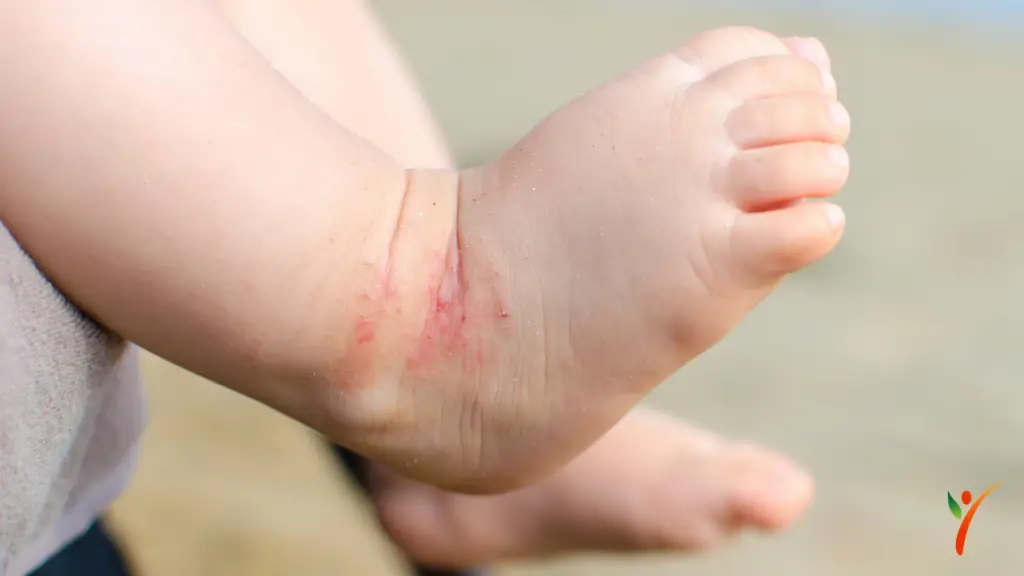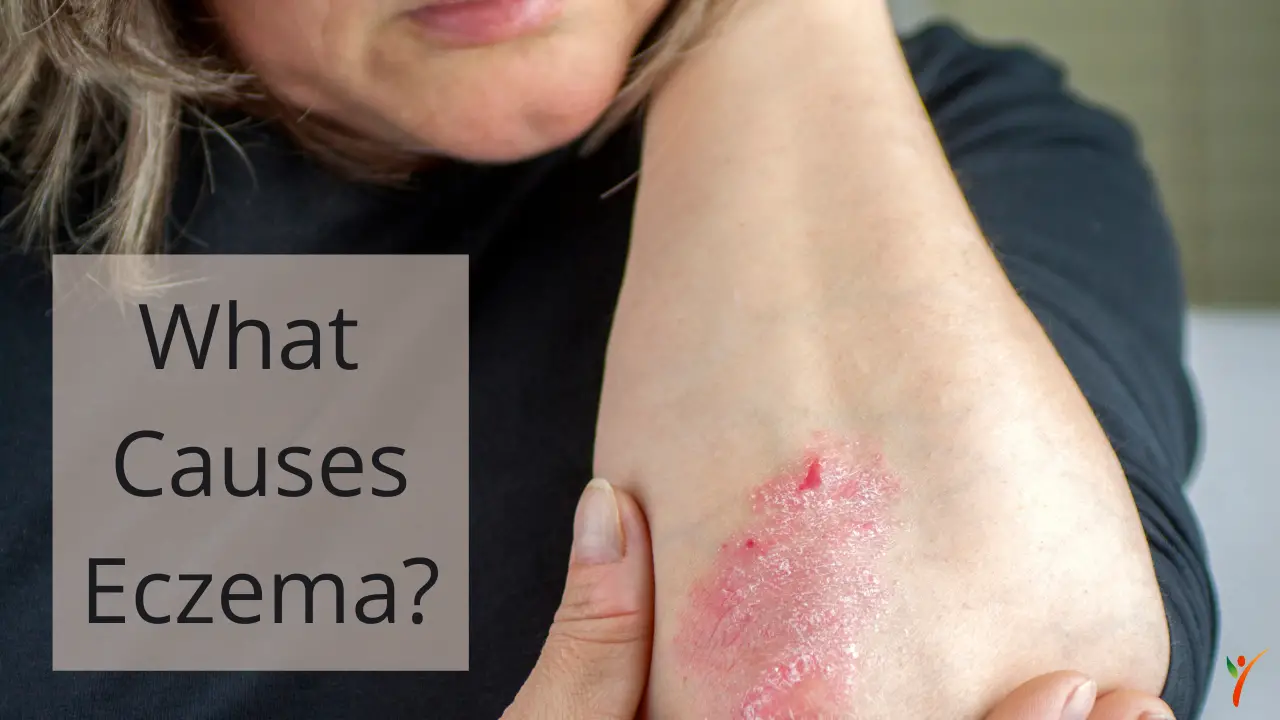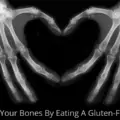If you or someone you know close to you suffers from eczema, you are well aware of how itchy and irritated the skin feels, which can also lead to sores on the skin. But did you know that the condition of your eczema majorly depends on what you eat or do not eat? Whatever you allow your body to consume plays a significant part in affecting your skin conditions.
Many people have this ubiquitous question – Does gluten cause eczema? Given the significant number of people affected by it, it is being widely researched. Surrounding this research is also the belief that a gluten-free diet helps with eczema. To understand if gluten causes eczema, it is essential to know about the relationship between the two.
Is There a Relation Between Gluten and Eczema?
Notably, individuals who have eczema, particularly the individuals who build up the skin condition before age 2, are bound to have food hypersensitivities. However, even without genuine food hypersensitivity, it is workable for specific nourishments to make eczema, even worse for extra sensitive people.
Although you are not oversensitive to food, it might trigger a T-cell (provocative) reaction. It, thus, could offer ascent to or worsen eczema.
Eggs, milk, nuts, and dairy are nourishments connected to eczema flare-ups, even in individuals who are not oversensitive. And gluten—a naturally occurring protein; in specific grains, specifically wheat, grain, and rye—may likewise establish a relation between gluten and eczema flare.
Does Gluten Cause Eczema?

Non-celiac gluten sensitivity cannot be termed as a celiac illness. In any case, scientists who are examining it state that those side effects incorporate stomach related problems, such as diarrhea, constipation, pains, and bloating, in addition to different manifestations, including brain fogging and skin conditions.
Eczema relates to gluten sensitivity. In particular, one 2015 study saw 17 individuals with non-celiac gluten sensitivity; who had skin issues, including rashes that resembled eczema, dermatitis herpetiformis, and psoriasis.
The study found that the subject's skin improved fundamentally within around one month when they embraced a sans gluten diet.
The possibility that gluten influences the skin is not a bleak one. For instance, gluten can cause a rash called dermatitis herpetiformis in specific people with celiac sickness, and going sans gluten-totally clears it up.
It is pertinent to note that gluten will not have a similar impact on everybody with eczema.
Food triggers are diverse for various individuals. So does gluten cause eczema is a question the answer to which depends from person to person.
Gluten Intolerance and Eczema
It is believed that gluten intolerance and eczema are two conditions that show up together, so they are more often than not associated with each other.
Gluten intolerance results from sensitivity to this specific protein. Up to 70% of our resistant cells live in the gut, and eczema will probably be the aftereffect—second rate hypersensitivities and sensitivities, which are showed using the invulnerable framework.
It is conceivable that dietary components are affecting our insusceptible immunity system and the two conditions.
By understanding the procedures in question, it is conceivable we can start to deal with our eating routine. Which thus can positively affect our health.
It has become apparent that individuals with celiac disease and gluten intolerance have a higher rate of skin issues than individuals unaffected by these conditions.
Prompting the subject of whether sensitivity to gluten could be capable additionally for eczema. It appears the insusceptible capacity has a significant part to play in these conditions.
On the off chance that the two conditions are happening together, expelling gluten (or at times different components) from your eating routine; has positively affected the skin. That is how a gluten-free diet reduces eczema.
Eating Gluten Can Cause Eczema:
A 2017 piece published in the Journal of Dermatological Treatment featured 169 individuals with eczema. The more significant part of the individuals who cut gluten from their weight control plans; agreed to see an improvement in their eczema indications.
A recent report found that among 149 members, 80% saw an improvement of their eczema manifestations when following a hypoallergenic diet; (which included removing gluten).
The principal disadvantage of these investigations is the small example size. Likewise, in these examinations, the gluten-free diet helped a few. However, not all eczema patients could see the control in their side effects. Other study subjects have noticed a gluten-free diet not to make any noteworthy improvement in skin inflammation.
Gluten and Eczema in Toddlers

You can see for the first-time visible evidence of eczema usually below the age of 2. So inevitably, the question again arises – does gluten cause eczema in a toddler?
Therefore, more often than not, a relationship between gluten and eczema in toddlers is sought to be studied to point out any food that the toddler may be consuming or lacking in their body, which gives rise to eczema.
Common Facts About Gluten Intolerance in Toddlers:
Eczema is more typical in kids than grown-ups, influencing around 1 out of 5 children younger than 2.
It usually shows signs of improvement with age; however, it never completely disappears.
The skin of individuals who experience the ill effects of eczema is extraordinary.
It does not stay moisturized just as it should, making it hard to hold the correct dampness, prompting agonizing dry skin.
Babies can begin demonstrating the dry, red, bothersome indications of eczema as early as about a month and a half.
As the baby develops and figures out how to scratch, the skin can turn out to be significantly redder and more disturbed.
There is some discussion about whether there is a connection between food and baby eczema.
At times, babies with eczema will have prompt and unfavorable responses to certain nourishments, incorporating gluten food.
Such toddlers' parents need to consult with a particular allergist and dietician to decide whether a specific food causes flare-ups.
Most youngsters will grow out of eczema by the time they are five.
Food Sensitivities In Children:
Food sensitivities in children with eczema are regularly created in the earliest stages, with a method of what you can call the double allergen introduction theory.
In the very first year of life whether the child is presented food through the skin or the gut, either sensitivity or resilience may grow individually.
If an infant receives food that they have an intolerance too, the immune system will, in general, form resilience to it. A food allergen may be presented through the skin. For instance, if the mother utilizes creams that contain nut oil – the skin's safe reaction can incline the kid to allergies and sensitivity to peanuts.
A newborn child with normal skin would not usually have this reaction. Be that as it may, in an infant with eczema, whose skin is harmed and aroused, the allergen particles are bound to enter the skin's barrier.
It is why children who have skin inflammation before 3 to 6 months; of age are substantially more prone to have a food sensitivity. In older kids – those who have eczema after the age of 2 – it is far-fetched that it is related to or driven by food hypersensitivity.
How to Help Eczema in Toddlers

As our comprehension of food sensitivity has advanced, so has our ability to deal with it. Since recognizable proof of the double allergen presentation speculation, studies and researches have indicated that staying away from food triggers is regularly insufficient because sensitization to the allergen; happens through the skin.
That brings allergenic nourishments into an infant's eating routine from as early as three months. It could be viable in forestalling hypersensitivities. It should never work without professional counsel. As it may, the Department of Health suggests infants ought to be solely breastfed; (or bottle fed) until six months of age, and conceivably allergenic nourishments should not be given before this age.
In a baby with gentle to direct eczema which is going to wean, studies suggest presenting the entirety of the allergenic nourishments; into the eating routine – including wheat – from around a half-year-old enough.
In older children, eczema is bound to be established or exacerbated by ecological components, such as stress or contamination. Be that as it may, that does not mean eating regimen is never a factor; as a pediatric dietician, Clare Thornton-Wood clarifies.
What Can You Do for Children Who Suffer From Eczema?
There are various kids with severe eczema flare who have encountered an incredible improvement in their eczema condition by removing wheat out of their eating routine.
Be that as it may; this occurs and continues with suitably prepared medicinal services professionals, such as an enlisted dietician. Because removing wheat can leave children lacking effective supplements.
For parents who presume that wheat hypersensitivity is setting off eczema in their youngster, the expert's recommendation is necessary.
Go to your GP, show them your child's food journal, and examine your interests. On the off chance that there is a solid case, get some information about a referral to a dietician.
Also, an inside and out solid, nutritious eating regimen wealthy in organic products, vegetables, and sleek fish; is significant for all kids, regardless of whether they have eczema.
In toddlers, eczema can affect any part of the body, majorly seen on the back and hands. Gluten and eczema on hands is something that is widely researched and remedies are being sought after.

Final Words:
If you agree that gluten, or some other food, adds to your (or your child's) skin inflammation flare-ups. It is imperative to tell your primary care physician. Your doctor may suggest keeping a food journal, dispensing with gluten for a brief period while looking for the development of indications, or even offer further testing.
But at the same time, you also need to remember that no verification disposing of any food from your diet will clear up eczema all alone. It is essential to continue with your conventional eczema medicines.
Doing the change to a san’s gluten diet is generally fitting on the off chance that you additionally have different manifestations of gluten-affectability; have been prone to have celiac illness, or if your eczema does not come under control with conventional treatment.
Whenever you limit your eating regimen, there are potential dangers. Without gluten, food is commonly low in fiber, so those following a gluten diet must take care to get enough fiber in their daily diet.
To further explain, individuals who are on a gluten-free diet are in danger of dietary lacks, explicitly vitamin B and also iron, calcium, and Vitamin D.
If you wish to attempt the elimination diet, start by separating explicit nourishments or nutrition classes from what you eat to check; whether your flare-ups die down. For best outcomes, try expelling each particular food or nutritional category in turn. Concentrate on a sound eating regimen loaded up with new foods grown from the ground, solid fats, and lean protein.
Attempting a gluten-free diet for a month or longer will not do you any harm, and it may even assist your eczema side effects. Discuss with your doctor, and ensure you adhere to an appropriate gluten-free diet; so you can decide if it helps your eczema manifestations.
Live Extraordinarily!






1 thought on “Does Eating Gluten Cause Eczema?”
Comments are closed.